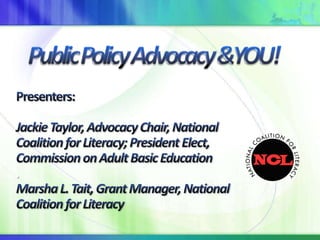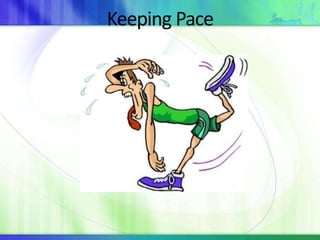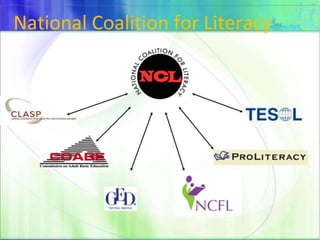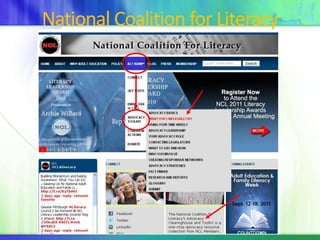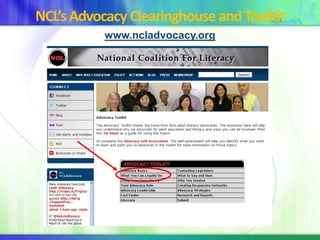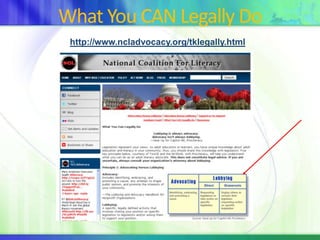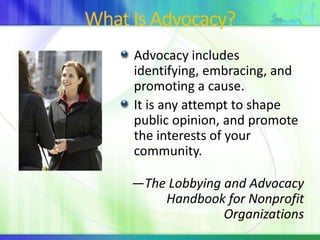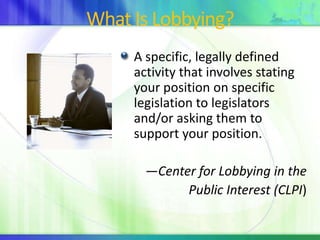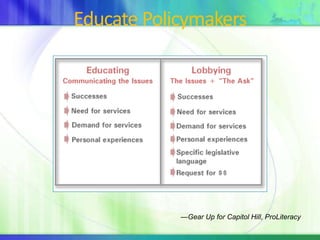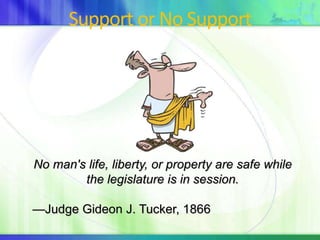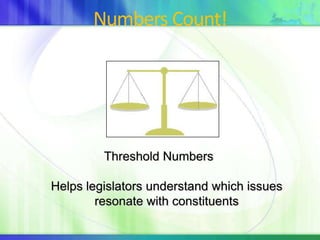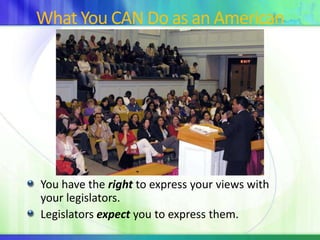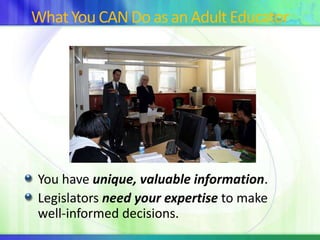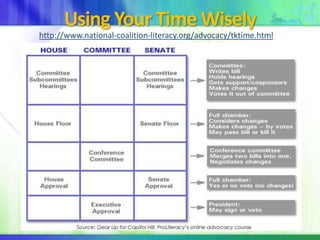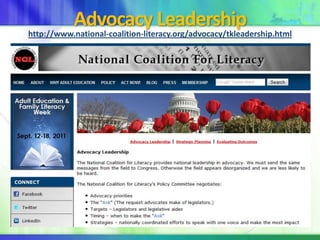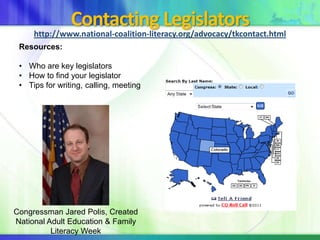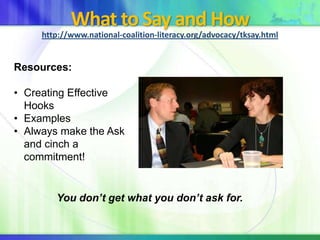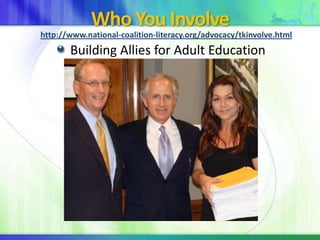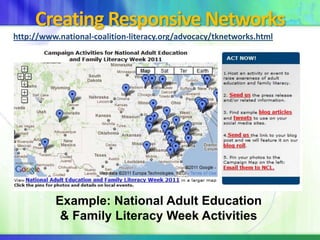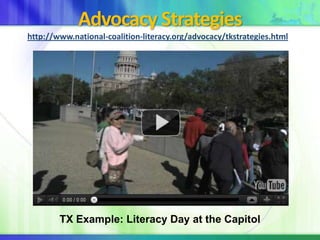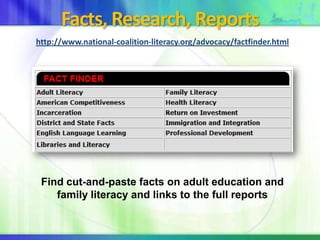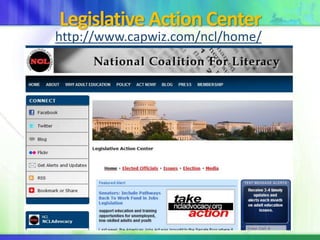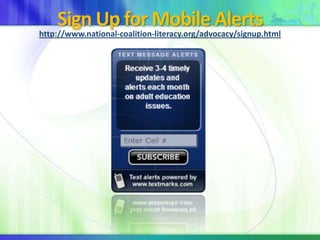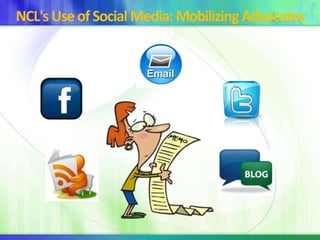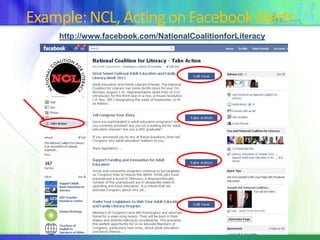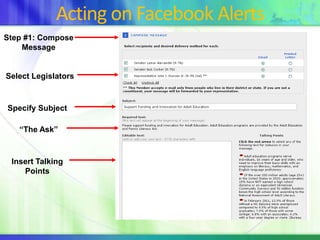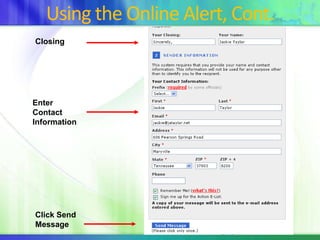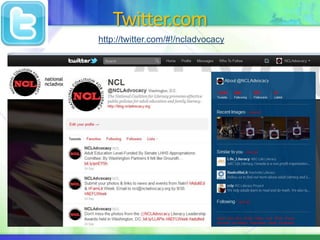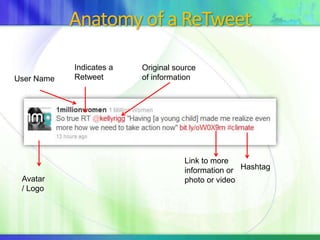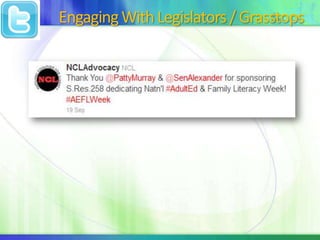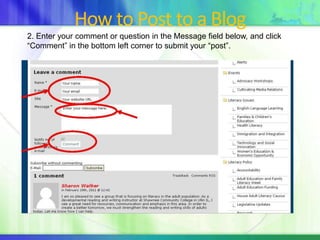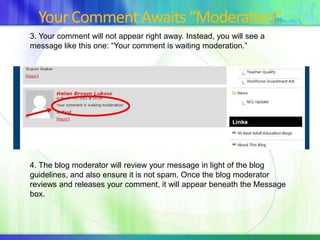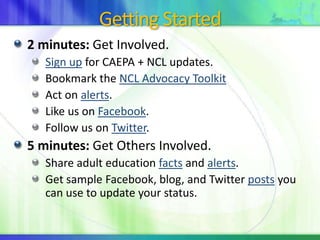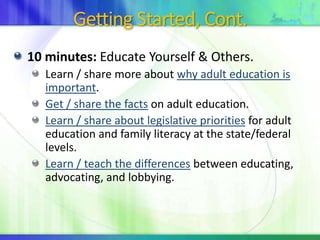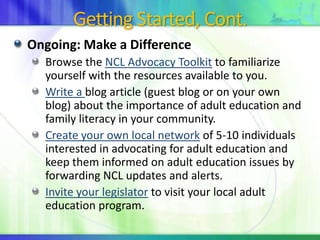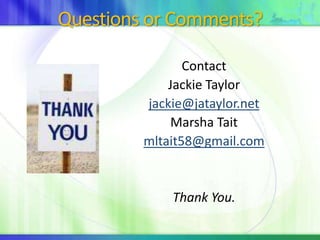Public Policy Advocacy & YOU!
- 1. .
- 2. Keeping Pace
- 4. National Coalition for Literacy
- 5. NCL’s Advocacy Clearinghouse and Toolkit www.ncladvocacy.org
- 6. What You CAN Legally Do http://www.ncladvocacy.org/tklegally.html
- 7. What Is Advocacy? Advocacy includes identifying, embracing, and promoting a cause. It is any attempt to shape public opinion, and promote the interests of your community. —The Lobbying and Advocacy Handbook for Nonprofit Organizations
- 8. What Is Lobbying? A specific, legally defined activity that involves stating your position on specific legislation to legislators and/or asking them to support your position. —Center for Lobbying in the Public Interest (CLPI)
- 9. Advocating Versus Lobbying Lobbying is always advocacy. Advocacy isn’t always lobbying. —Gear Up for Capitol Hill, ProLiteracy
- 10. Educate Policymakers —Gear Up for Capitol Hill, ProLiteracy
- 11. Support or No Support No man's life, liberty, or property are safe while the legislature is in session. —Judge Gideon J. Tucker, 1866
- 12. Numbers Count! Threshold Numbers Helps legislators understand which issues resonate with constituents
- 13. What You CAN Do as an American You have the right to express your views with your legislators. Legislators expect you to express them.
- 14. What You CAN Do as an Adult Educator You have unique, valuable information. Legislators need your expertise to make well-informed decisions.
- 15. Using Your Time Wisely http://www.national-coalition-literacy.org/advocacy/tktime.html
- 17. Contacting Legislators http://www.national-coalition-literacy.org/advocacy/tkcontact.html Resources: • Who are key legislators • How to find your legislator • Tips for writing, calling, meeting Congressman Jared Polis, Created National Adult Education & Family Literacy Week
- 18. What to Say and How http://www.national-coalition-literacy.org/advocacy/tksay.html Resources: • Creating Effective Hooks • Examples • Always make the Ask and cinch a commitment! You don’t get what you don’t ask for.
- 19. Who You Involve http://www.national-coalition-literacy.org/advocacy/tkinvolve.html Building Allies for Adult Education
- 20. Creating Responsive Networks http://www.national-coalition-literacy.org/advocacy/tknetworks.html Example: National Adult Education & Family Literacy Week Activities
- 21. Advocacy Strategies http://www.national-coalition-literacy.org/advocacy/tkstrategies.html TX Example: Literacy Day at the Capitol
- 22. Facts, Research, Reports http://www.national-coalition-literacy.org/advocacy/factfinder.html Find cut-and-paste facts on adult education and family literacy and links to the full reports
- 24. Sign Up for Mobile Alerts http://www.national-coalition-literacy.org/advocacy/signup.html
- 25. NCL's Use of Social Media: Mobilizing Advocates
- 26. Example: NCL, Acting on Facebook Alerts http://www.facebook.com/NationalCoalitionforLiteracy
- 27. Acting on Facebook Alerts Step #1: Compose Message Select Legislators Specify Subject “The Ask” Insert Talking Points
- 28. Using the Online Alert, Cont. Closing Enter Contact Information Click Send Message
- 30. Anatomy of a ReTweet Indicates a Original source User Name Retweet of information Link to more information or Hashtag Avatar photo or video / Logo
- 31. Engaging With Legislators / Grasstops
- 33. NCLAdvocacy Blog http://blog.ncladvocacy.org 1. Click on the title of the blog post where you wish to post a comment or question.
- 34. How to Post to a Blog 2. Enter your comment or question in the Message field below, and click “Comment” in the bottom left corner to submit your “post”.
- 35. Your Comment Awaits “Moderation” 3. Your comment will not appear right away. Instead, you will see a message like this one: “Your comment is waiting moderation.” 4. The blog moderator will review your message in light of the blog guidelines, and also ensure it is not spam. Once the blog moderator reviews and releases your comment, it will appear beneath the Message box.
- 36. Getting Started 2 minutes: Get Involved. Sign up for CAEPA + NCL updates. Bookmark the NCL Advocacy Toolkit Act on alerts. Like us on Facebook. Follow us on Twitter. 5 minutes: Get Others Involved. Share adult education facts and alerts. Get sample Facebook, blog, and Twitter posts you can use to update your status.
- 37. Getting Started, Cont. 10 minutes: Educate Yourself & Others. Learn / share more about why adult education is important. Get / share the facts on adult education. Learn / share about legislative priorities for adult education and family literacy at the state/federal levels. Learn / teach the differences between educating, advocating, and lobbying.
- 38. Getting Started, Cont. Ongoing: Make a Difference Browse the NCL Advocacy Toolkit to familiarize yourself with the resources available to you. Write a blog article (guest blog or on your own blog) about the importance of adult education and family literacy in your community. Create your own local network of 5-10 individuals interested in advocating for adult education and keep them informed on adult education issues by forwarding NCL updates and alerts. Invite your legislator to visit your local adult education program.
- 39. Questions or Comments? Contact Jackie Taylor jackie@jataylor.net Marsha Tait mltait58@gmail.com Thank You.
Editor's Notes
- Hi! [Introduce selves]Today we’re going to share a one stop national collection of advocacy resources and what can be done in minimal amounts of time.The NCL Advocacy Clearinghouse and Toolkit is made possible with generous support from the Dollar General Literacy Foundation.
- NCL and its members lead advocacy efforts and identify all key decision points in the authorization, budget and appropriations processes. They are mindful of your time and only mobilize the grassroots when they need help. In this section of the toolkit you’ll find resources on the legislative process and key points for advocacy. The Bottom Line is to advocate early in the legislative process. This impacts decisions when they are just beginning to take shape. The further along a bill progresses in the legislative process the more difficult it is to influence it. See the handout in your folder on Using Your Time Wisely. You can use this to plan when you are most likely to be asked to take grassroots action, what action is needed, and where you can find the resources to support you for these actions.
- Advocacy Leadership contains information on how the Coalition makes policy decisions via consensus in order to send the same, consistent message to Congress. In it you’ll also find resources for strategically planning your own advocacy agenda and for evaluating outcomes of your advocacy efforts.
- Contacting Legislators contains resources for communicating with legislators and their staffs, including tips for writing, calling, and meeting with legislators. Find out which legislators are also key to adult education and family literacy. Some legislators are more important to us than others because they sit on key committees that make decisions that impact adult education and family literacy. However, every legislator is important and can become a champion for our cause, like Congressman Jared Polis of Colorado. For three consecutive years he created legislation to dedicate National Adult Education and Family Literacy Week!
- Contains tips and resources for creating responsive networks, including links to advocacy role descriptions for state, district, and local contacts; comparison charts of other state advocacy networks and resources from states.
- Engage with policymakers and partner organizations where existing relationships exist, or where there is potential for relationship building.Go to “What to say and how” for sample hooks: http://www.ncladvocacy.org/tksay.html

